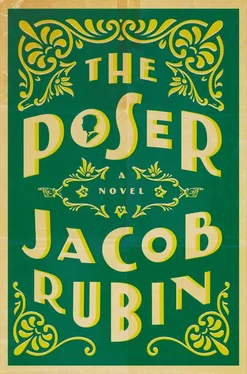. . or if a Sparrow come before my Window I take part in its existence and pick about the gravel.
JOHN KEATS
Imitation is criticism.
WILLIAM BLAKE
“There you are! Christ!” Anthony Vandaline, of all people, came waddling up the stairs. “I’m a pilgrim in the dark. I’m searching and searching. And — ah, finally.”
At this late hour, only four men remained at the balcony bar, stoking each other’s laughter with shouted stories. One even bent at the waist, gripping the back of a chair. Performing for me. Soon, I knew, would come the sharp compliment or offered beer, and I prepared myself by seeming unaware, a man immersed in his life. I stroked Lucy’s hand, doing that thing where I looked from her hands up to her eyes and down again. What she was saying in that low voice, however, the one she risked only when we were alone, I can’t rightly say, for I was listening to the men.
Then Vandaline arrived, and they fell silent. Lucy stood to meet him.
“Ugh, you’re one of those people who’s always heeere ,” she said. “It’s like I’m gonna turn around and trip on you.”
“Look, my priest is gonna blush at this thing when I print it in full. All my sins. But I was talking to Max, and he said, and I quote, ‘the heart of his technique is something called’—yeah, here it is—‘the thread.’”
A show tune played through the house speakers.
“Now you answer this,” Vandaline said, “and I’m gone. I mean, I walk out the door.”
“It’s a skill you should practice more,” Lucy said.
“Doll, whatever you think of me, I’m after the truth. A servant of the truth. A butler to it, truly,” he said. “Now I wasn’t wrong about everything, was I? Your man Maximilian printed that profile about Giovanni, so I did what any reporter worth his salt would do, didn’t I? I checked the facts, humbly, and published them. Humbly.”
“But what happened then?” I asked, half-turning to the men who tittered at the attention, like schoolboys before an upperclassman.
“Did I get overzealous?” Vandaline said. “Guilty as charged. But, boy, oh, boy, did you prove me wrong. Hell, I’m shaken up just standing here. You think I wanna stand here after what happened tonight? I’m just a butler with my plate, asking someone to put the truth on it, so I can serve it to the public. Warm and tasty. Now, I’m gonna correct the whole thing in tomorrow’s column. My god, am I gonna correct it. This is gonna be the best goddamn advertising you ever got — not that you need it. But, in all seriousness, please, just tell me about the thread.”
“If Max lied earlier,” I said, “why isn’t he lying now?”
“Are you saying he is?” Like a man in a shootout pulling for his gun — with that practiced, defensive quickness — the reporter raised the pen to his pad.
“No,” I said.
To my surprise Vandaline didn’t harass the pause that followed, waiting for me, I guess, to say more. Bless him. Despite himself, he was a collaborator. When earlier in the night, Max’s patter was derailed by the appearance at the foot of the stage of a stubby man declaring that I was a fraud and pretender — well, I immediately recognized Vandaline and was pleased, for I knew he would insist on joining us onstage, where I could do him once and for all.
So it was when he appeared at the balcony bar. In my churning waltz with the public, there was a time to lead and a time to be led, and the upstairs bar of the Communiqué at two a.m. did feel like the venue for a second performance, more intimate than the night’s formal entertainment. “The thread,” I said. Downstairs they’d started stacking chairs and clearing the stage. Shadowy figures scooped up a table’s glasses, four in a hand, and pushed, back first, through the doors. “Well, okay, so most people believe imitation to be an art of exaggeration. There’s truth to this, of course. It’s important, as a tool, it is. But it comes second.” Bernard, I noticed only then, sat at the end of the bar. It might have been a photo of him if not for the smoke rising from his cigarette.
“Now I was fortunate to be born with the elastic limbs, the perfect pitch you and your colleagues have been kind enough to write about. But I would have been lost without this knowledge: The real thing, the heart of it, isn’t exaggeration, or even duplication. It’s selection : knowing which parts of a person to take and which to leave alone.” I frowned the way people do to indicate a concept too complex to be articulated. “You see, everyone disguises himself with certain gestures. A man clearing his throat while snapping open a newspaper, the way a woman covers her yawn on the bus — these gestures are a costume. Now some do it better than others. Some have made perfect little suits for themselves: politicians, for instance, movie stars. Those charismatic types who tool around in their bodies like rented sports cars. They’re smooth , right?”
Vandaline held the notepad at his chest like a cop writing a ticket.
“The miracle of the world, Mr. Vandaline, is that no one’s disguise is perfect. There is in every person, no matter how graceful, a seam, a thread curling out of them. It’s like a pimple that rouge cannot cover up, a patch of thinning hair. Often, it’s the almost-unnoticed thing that’s a thread: a bit lip, a slight sigh. But when pulled by the right hands, it will unravel the person entire.”
In the silence I knew would follow I found myself thinking of Mama. How she and Mr. Derringer looked that day in the glass of the principal’s door: a patch of red (Mama), a blob of black (Derringer). It was a sort of magic, what the closed door did to them, or seemed like it from the outer office where I was made to wait. Across from me, the principal’s secretary, Mrs. Chappabelle, mouthed words she clacked on a typewriter, out of view. Every few minutes she’d look up at the desk’s basket of candy canes. “You don’t want a tasty treat?”
The smile I was holding began to wilt.
“Suit yourself. But if you change your mind, you know exactly where they are.” She winked and had lowered her gaze to the typewriter, thank God, when I burped up, “Suit yourself.”
“What was that?” The phone on her desk rang. “Principal Derringer’s Office… Oh, hi, Susan. Yes. But. No. He’s in a… you want me to — perfect. Five o’clock at the — okay, great.”
There was a giggling by the door where two girls stood. They grinned like hobos: mouths pocked with missing teeth. “Freak,” they whispered. “Monkey.” I was standing up when the principal’s door yawned open, and out strode Mama. There must have been an event at the library for she wore her fanciest dress: the checkered one with the belted waist and big bow at the collar. It didn’t matter what she wore. Mama was the queen of every room.
She thanked Mrs. Chappabelle, took my hand, and walked me out of the office. Outside it was overcast, and the wind sprayed a hint of salt on the school building, Main Street, and the animal-faced cars as if to prevent it all from going bad. When we reached the curb, Mama looked down at me with an exaggerated frown. It did no harm. Beatrice Bernini was a beautiful woman, I’d heard other parents say. “That Derringer’s a real crow, isn’t he? Someone ought to tell him life’s already started.”
With that, she snatched my hand and just short of skipped me across Main Street, past Lipswitch Avenue to the gusty boardwalk where she plopped down on a bench and promptly folded her legs. She patted the space next to where she sat, and I joined her. Before us stretched the ocean, its gulls and clouds. “Ah, school’s all screwed up. How to laugh. What jokes are. Those should be the first things they teach you. Come.” I sat stiff as a post until she’d ducked behind me and lit a cigarette. “Mr. Heedling, huh?”
Читать дальше












